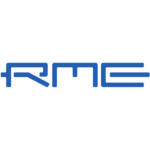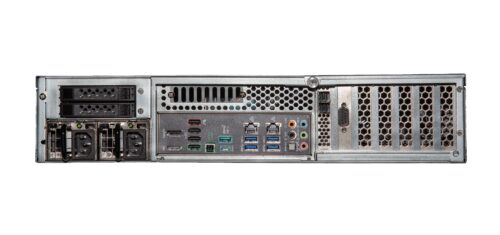Beskrivning
M-32 AD Pro II, High-end-32-channel 192 kHz AD Converter with AVB
The M-32 Pro II series is designed to meet the demanding requirements of professional studios, immersive sound installations, live sound systems, and industrial applications that need a reliable solution for analog conversion with high-end network audio processing. These new converters are available with either 32 analog inputs or outputs, and either with Dante? or AVB for a choice of four different models. Boasting up to 32-channels, fully equipped MADI I/Os (coaxial & optical via optional SPF module), improved specs with extremely low THD values, intelligent channel routing and innovative usability, the brand-new M-32 Pro II Series truly represents the state-of-the art in exceptional audio performance.
The Ultimate Solution for High-End Network Audio Processing
The latest 32-channel M-32 Pro II is based on state-of-the-art, high-resolution converter components and a fully balanced analog circuit design that offer signal-to-noise ratios of 120 dB(A) with very low latencies ? placing the converters in the reference class. While the M-32 AD Pro II offers the same outstanding analog performance as its predecessor, the DA-Converter has even improved the THD+N to -111 dB. All models benefit from impulse response optimization at sampling rates of 88.2 kHz and higher to minimize ringing artifacts in the conversion process.
Plug & play – rapid user interaction
Control all device states directly from the front panel for convenient, direct access to all features. RME AVB devices can be reached over network (including wirelessly over Wi-Fi) and USB for convenient remote access, allowing the rapid creation of gain groups, phantom power switching and clock configuration. In addition, a JSON based API and even SysEx MIDI commands can be used to integrate each model virtually anywhere. The integrated routing matrix allows single channel routing across all analog and digital I/O. As such, problem-solving of signals, clocking, connectivity or other issues is both simple and straight-forward!
AVB Audio Networking – 2 fully redundant network ports
In addition to the two MADI I/Os including separate signal routing, the new M-32 DA Pro II and M-32 AD Pro II feature an AVB interface based on the open network standards IEEE 802.1 and 1722.1, enabling transmission of the 32 analog channels at a maximum 192 kHz sampling rate via a single Ethernet cable. Combined with external AVB switches, the new M-Series converters can be quickly, easily and reliably integrated into more complex network structures thanks to the comprehensive time-synchronous signal processing of the AVB protocol. Up to 128 audio channels at 48 kHz (96 @ 96k, 64 @ 192k) can be sent and received over AVB in total across all streams.
RME offers an AVB device with two fully redundant network ports, based on the recommendations of MILAN?. The RME AVB Core has meticulously implemented the IEEE standards for audio- streaming, discovery and control, allowing RME devices to be both discovered and fully controlled by any AVB controller, and making vendor-specific control protocols a thing of the past. Any signal reaching the M-32 Pro II can be routed and streamed over a network with fixed latency and guaranteed bandwidth – no switch configuration is required!
Analog Line Level Performance
For maximum compatibility with a variety of analog hardware, the individual channels of the M-32 AD Pro II and M-32 DA Pro II can be operated with different line levels – each with full resolution of the converters. Besides +19 dBu and +13 dBu, the new M-Series is one of the few solutions available on the market that also allows working with the SMPTE? recommendation of +24 dBu at 0 dBFS.
Easy to Operate
Tri-color back-lit channel label fields offer an almost indispensable advantage in fixed installations. Using the provided transparent papers, users can create individual channel labels and securely affix them behind a magnetic cover, where they are illuminated depending on signal level. This provides a comprehensive overview of analog channel assignments and signal flow.
Updates included
With hardware built to last, RME makes sure the firmware running on the device does not fall behind. Since the release of the first version of the M-32 Pro, numerous feature updates have been released, delivering an increase of AVB total stream and channel count from four streams (64 channels) to nine streams (128 channels + additional CRF clock stream), additional stream formats, numerous adjustments for MILAN? compatibility, single channel routing, preset upload and download, configurable preset names, static IP address assignment, and many more. They reflect the ongoing commitment of RME developers to sound engineers that expect the best performance of their devices for years to last.
Specs
M-32 AD / M-32 DA Pro II
32 x Analog In/Out (25-pin D-sub, up to +24 dBu)
2 x MADI I/O (via optional available optical SFP and coaxial BNC, up to 128 Ch.)
2 x RJ45 1 GigE AVB, four streams with 4/8/12/16 Ch. each
(optional) MIDI I/O for legacy MIDI Remote
Word Clock I/O (BNC)
USB 2.0 (for remote control)
2 x monitored fully redundant internal PSUs
32-channel AD converter, fully symmetrical design, 120 dBa
19? enclosure 1 unit height
Large, tri-color backlit channel indicators with Peak/RMS metering
Magnetic cover with customizable channel labels
SyncCheck? and ICC? – detects when a clock source is not in sync and falls back to other available signals
MADI Auto-Input – seamless redundancy
2? display with control knob for full device control
15 Preset storage, firmware upgrade persistent
Lock (optional code) and dark mode
Internal routing of up to 224×192 M-32 AD Pro / 192×224 M-32 DA Pro channels in 4 channel blocks (32 x Analog, 64 x MADI Opt, 64 x MADI Coax, and 64 x AVB)
Remote control via HTTP, JSON, IEEE 1722.1 AVDECC ] MIDI over MADI and optional MIDI
M-32 Pro DA II Line Out 1-32:
Resolution: 24 bit
Output level switchable per channel +24 dBu, +19 dBu, +13 dBu @ 0 dBFS
Outputs DC coupled, fully symmetrical signal path (”truly balanced”)
Output impedance: 200 Ohm balanced, 100 Ohm unbalanced
Signal to Noise ratio (SNR) @ +13/+19/+24: 116 dB RMS unweighted, 119 dBA
Frequency response @ 44.1 kHz, -0.1 dB: 0 Hz ? 22 kHz
THD @ -1 dBFS: < -109 dB, < 0.00035 %
THD+N @ -1 dBFS: < -107 dB, < 0.00043 % Channel separation: > 110 dB
For more information please visit RME Audio






